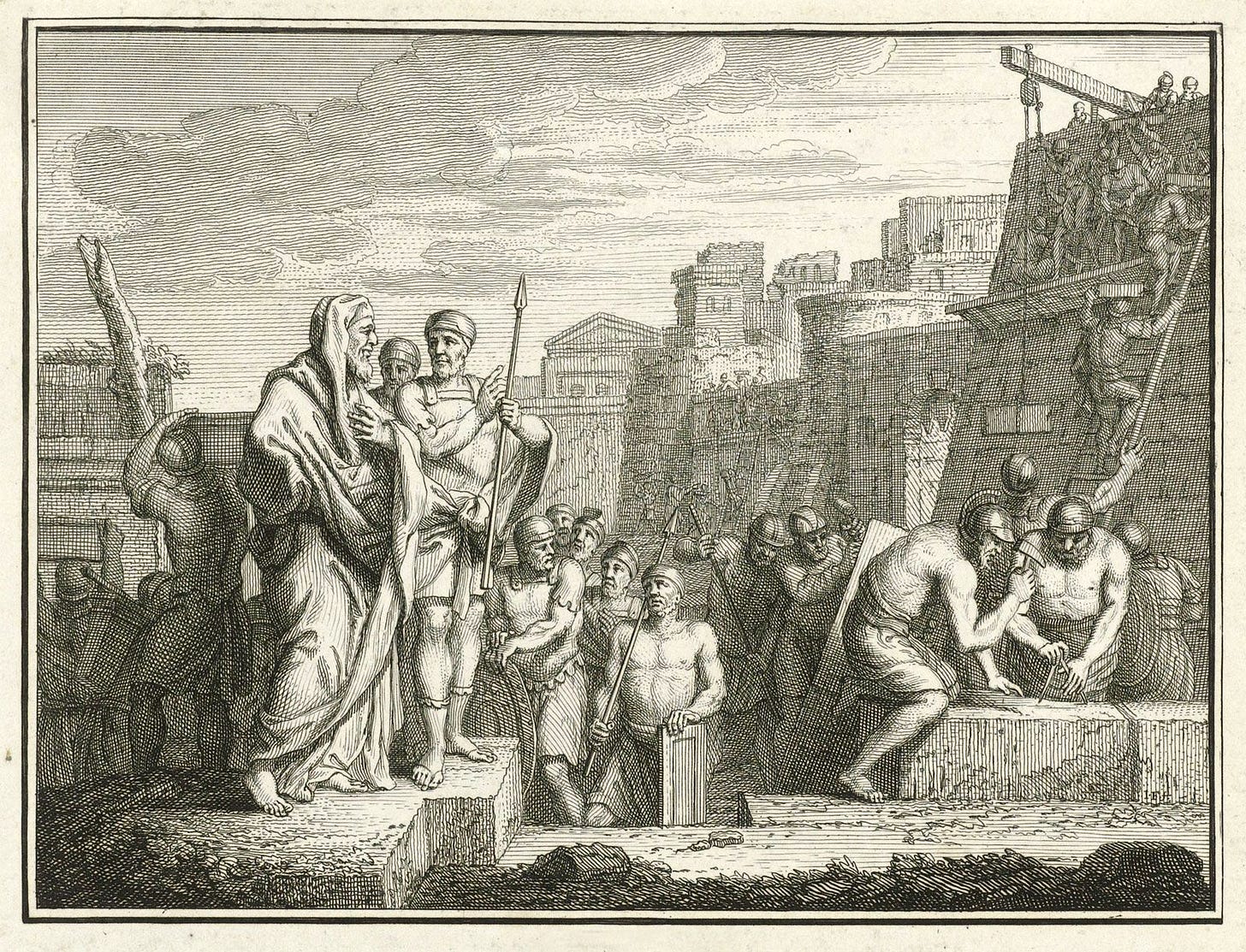Key points upfront:
-
We all have a purpose in life, but we don’t always embrace it
-
Those who embrace purpose find victory and fulfillment
-
There are three steps to walking in purpose (no pun intended)
Serendipity. Luck. Good fortune. Favor. There are a bunch of terms that we use to describe the experience when things just seem to go our way. When all of the pieces fall perfectly into place.
We’re spreading almond butter on a slice of bread, then – BAM – raspberry preserves magically appear out of nowhere. (What? Too bourgeois? pfft. Suit yourself.)
Does it always work out that way? Of course, not. But sometimes we tell ourselves it won’t work out specifically because we don’t want to be disappointed. Or because we’re scared. Or because we don’t want to take on the challenge of doing something big. So instead we pre-disappoint ourselves or pre-discourage ourselves out of taking any action. Is that really how we want to live?
"Hanani, one of my brothers, came from Judah with some other men, and I questioned them about the Jewish remnant that had survived the exile, and also about Jerusalem. They said to me, “Those who survived the exile and are back in the province are in great trouble and disgrace. The wall of Jerusalem is broken down, and its gates have been burned with fire.” When I heard these things, I sat down and wept. For some days I mourned and fasted and prayed before the God of heaven."
-- Nehemiah 1:2-4
Ok, so let’s set the scene here. The Israelites had been exiled from Jerusalem for some seventy years following their defeat at the hands of King Nebuchadnezzar and the Babylonians. For all of that time, they had been scattered throughout the region as captives/residents of the various kingdoms (mainly Babylon and Persia) and were just starting to return home.
Nehemiah is one of those exiles, living in Persia, and serving in the royal court of King Artaxerxes. He learns from his brother, who has just returned from Jerusalem, that the previous waves of returning Israelites have been unable to rebuild the city, and the wall is still in disrepair.
He takes this news extremely hard, so much so that he decides to fast and pray to God for a solution. Then:
In the month of Nisan in the twentieth year of King Artaxerxes, when wine was brought for him, I took the wine and gave it to the king. I had not been sad in his presence before, so the king asked me, “Why does your face look so sad when you are not ill? This can be nothing but sadness of heart.” I was very much afraid, but I said to the king, “May the king live forever! Why should my face not look sad when the city where my ancestors are buried lies in ruins, and its gates have been destroyed by fire?”
-- Nehemiah 2:1-3
So, three months later, Nehemiah is still saddened by the news of Jerusalem. He is visibly upset, perhaps on purpose.
Mind you, he is not in Jerusalem, nor - as far as we can tell - has he ever been there. He has not seen the city for himself, not in its heyday, or its fallen state of the present. He has certainly not been overwhelmed by 24/7 news coverage on TV, or harrowing reports from citizens and journalists on social media. He got one report from one person, and all he could think about was how the city of his ancestors needed help. That was enough.
This is what purpose does to us. It gnaws at us. It gives us no peace. We can scarcely string together two moments in a row without some purposeful thought invading our consciousness and our mood. We can imagine that for that whole 3-month period, Nehemiah was wracking his brain trying to figure out what would become of the city, and how and when (not if) it would be restored to its former glory.
He had already resolved that he was going to do something. His fasting and praying wasn’t for God to perform a miracle, or that some other people might step up to answer the call. He was asking for the ability to do something himself. Eventually, he got the chance.
The king said to me, “What is it you want?” Then I prayed to the God of heaven, and I answered the king, “If it pleases the king and if your servant has found favor in his sight, let him send me to the city in Judah where my ancestors are buried so that I can rebuild it.”
-- Nehemiah 2:4-6
Despite whatever trepidation Nehemiah might’ve felt (I can’t imagine complaining to the king about anything was typically well-received), he courageously shares the cause of his sadness.
Sometimes we have to put ourselves out there. We have to speak truth to power. We have to put our jobs, our status, and maybe even our necks on the line for the things that matter.
This is what we must do for our purpose. To meet the challenge of it head on. To pursue it with vigor and determination. That we might fulfill it, or at least wrestle with it honorably.
Every one of us will have this moment. Every one of us will have this challenge. We will confront a cause or issue that fits us like the missing piece of a jigsaw puzzle, and us, it. In fact, over the course of a long life, we may be blessed to have several.
So what do we do when we confront these causes?
1. Answer the Call
Don’t resist it. Struggling only makes it worse. Of all troubles in the world, this one is yours, and the sooner you recognize it and own it, the better. In fact, there should be a measure of peace and joy that comes with it, even as you grapple with the weight of it. Because you’ve found your thing, your purpose, your magnum opus. Yippee!
Nehemiah knew that restoring the city was his cause. He didn’t need an assignment from the king or anyone else. He embraced it on his own, and immediately sought the Lord for guidance and favor. And he carried the responsibility of it everyday until he saw it through.
2. Submit to It
We have to make space for purpose in our lives. In many respects, purpose becomes our life. It is, for a time at least, our raison d’etre. Carve out the time and energy you need to learn, to strategize, to seek guidance and support, and certainly to pray and fast. Give yourself to your purpose as to God, because indeed they are the same. Romans 8:28 tells us that “in all things God works for the good of those who love him, [and] who have been called according to his purpose.” We have been called to fulfill our God-given purpose with our God-given gifts and abilities. It’s why we’re here. It’s what we were made for.
3. Expect to Find A Way
This is the best part. It’s also the part that we miss, forget about, or can’t quite reconcile. If God is all-powerful [check], and if He anoints us for a specific task [check], doesn’t it logically follow that He will provide us with the tools, resources, and divine assistance needed to complete that task? Umm, yeah.
Is there any situation in the Bible where someone was encouraged to do some noble work and didn’t receive the means to complete it?
Go ahead, I’ll wait.
While you’re searching for that example that doesn’t exist, let’s look at what God did do for Nehemiah;
"Then the king, with the queen sitting beside him, asked me, “How long will your journey take, and when will you get back?” It pleased the king to send me; so I set a time. I also said to him, “If it pleases the king, may I have letters to the governors of Trans-Euphrates, so that they will provide me safe-conduct until I arrive in Judah? And may I have a letter to Asaph, keeper of the royal park, so he will give me timber to make beams for the gates of the citadel by the temple and for the city wall and for the residence I will occupy?” And because the gracious hand of my God was on me, the king granted my requests. So I went to the governors of Trans-Euphrates and gave them the king’s letters. The king had also sent army officers and cavalry with me."
-- Nehemiah 2:6-9
Nehemiah didn’t just get authorization to go, he got supplies, special clearances, and protection. He also got all the time he needed to complete the task. That’s favor. Favor produced by him believing in the work he was doing, and walking boldly in it.
Needless to say, Nehemiah did go on to repair the city and the wall. Not without obstacles or opposition, of course, but he and his team got it done in just 52 days, which must’ve felt like a miracle in and of itself. But even with the quick turnaround time, each phase of the process presented new challenges for him to wrestle with and overcome.
We can all be like Nehemiah, taking on big goals that advance the kingdom, and believing in the manifestation of His favor along the way. We can also be like Hannibal, from the 80’s television show, The A-Team, who was famous for saying, “I love it when a plan comes together.” Indeed, it’s an awesome feeling everything clicks.
To be clear, your plan will not always come together. Nobody’s plan does. But we can have the attitude that it will, and not allow ourselves to be dismayed if it doesn’t. Maybe a better plan will emerge. Maybe the obstacles we’re facing will yield a greater blessing down the road.
Galatians 6:9 encourages us to “not become weary in doing good, for at the proper time we will reap a harvest if we do not give up.”
Don’t give up, beloved. Not on yourself, or your purpose. Press on.
Note: this post originally appeared on our founder's personal blog, All Systems Full.













